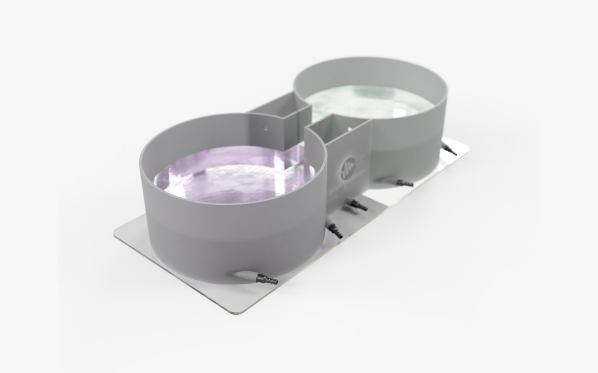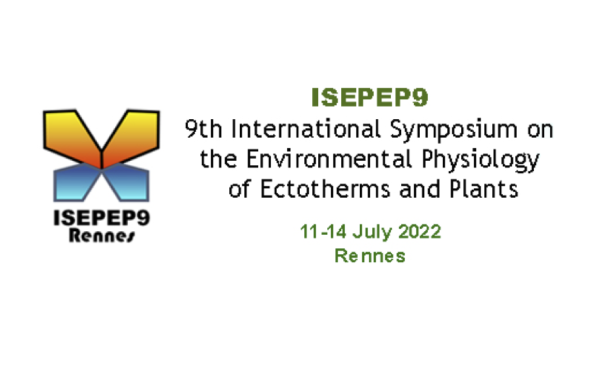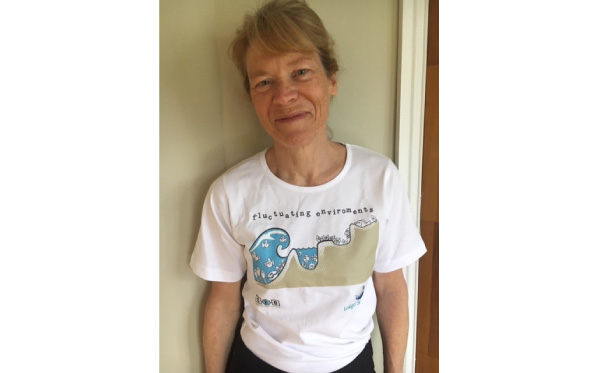News
Tue, Jul 05 2022
A decade of Aqualab
The Harald Crabtree Aqualab: Centre for Aquatic Sciences can now celebrate 10 years as a highly active research lab! A recent article enlightens some of the over 50 people that has been working in the lab, and how the lab has shaped the academic life of many researchers.
The article has been published by Mount Allison University, and can be found here: Mount Allison’s Harold Crabtree Aqualab turns 10 | Mount Allison (mta.ca)
Twitter users may also like to read (and retweet!) Dr. Tyson MacCormack’s tweet about the news: Scienfisht på Twitter: "The HC Aqualab at Mount Allison is impressive and it has now been running (in its current form) for a decade! (pictured in the article is one of my well-used/abused @LoligoSystems swim tunnels) https://t.co/Sx2HvhcE24" / Twitter
The Loligo® Systems team congratulates Aqualab on its decennial anniversary. We hope for (at least) another 10 years of top tier research, and we encourage all to check out their facilities.
Mon, Feb 21 2022
New Shuttle Box Software and Hardware
Check out our new shuttle box systems
We offer complete and fully automated shuttle box systems for preference/avoidance experiments in aquatic invertebrates and fish. The systems include all the necessary hardware and software for experiments with temperature, oxygen, salinity, pH/CO2, and combinations hereof.
Simply choose a core shuttle box system, and then add up to two add-on shuttle box systems to run a full featured 3-tank setup. In other words, you can now run three shuttle tanks at the same time, and you can even track multiple objects per tank thanks to our new ShuttleSoft 3 software.
For the first time since 2009, a new and major upgraded version of our ShuttleSoft software is available! ShuttleSoft 3 is compatible with almost all video files and cameras, and with our new industrial grade LAN/Bluetooth power strip (PowerX4) for pump/valve control, and WTW data logger interface – our shuttle box systems for animal preference/avoidance behavior have never been smarter.

The new PowerX4.
Current users of ShuttleSoft, as well as newcomers to shuttle box experiments, will appreciate the many new time-saving features and user-friendly software, as well as a detailed data analysis and statistics section, and improved performance in an intelligible, clean-looking software.

Live overview of shuttle tank water parameter regulation.
One of the main benefits is the video performance enhancement and multiple tank operation. ShuttleSoft 3 can handle simultaneous recording, logging, and regulation in up to three shuttle tanks at a time – all from a single PC. You also have the option of tracking multiple animals per tank, which means that you can run shuttle box experiments with much higher throughput than before.
You can also record videos of your static and dynamic shuttle box experiments directly in ShuttleSoft 3 – a good tool for documentation. Static experiments videos can then be tracked and analyzed whenever you want with the new offline video file tracking functionality. And ShuttleSoft now supports a long list of camera models and video file formats.
Another new feature in ShuttleSoft 3, is the built-in data analysis section. This functionality allows the user to see statistics and visual representations of your data. And if you are running live experiments, all data are shown live as well!

Live data representation from a running shuttle box experiment.
ShuttleSoft 3 connects seamlessly with required hardware for video capture and water quality control via LAN, Bluetooth, and USB. No more analog signals (read: no more noise)! Use the handheld 3310 meters from German WTW for sensing temperature, oxygen, salinity, and pH/CO2, or our Witrox instrument for oxygen and temperature experiments.
Tell me more!
- More about ShuttleSoft 3
- More about the shuttle box systems
- Quick guide for ShuttleSoft 3
I want to try a demo!
You can download and try a free demo version of ShuttleSoft 3 with limited functionality.
Wait, I have a question!
Feel free to contact us any time with questions or concerns. If you prefer to discuss via a video meeting, we will be happy to arrange a session.
Fri, Jan 14 2022
Sponsoring the ISEPEP9 symposium
We are sponsoring the 9th International Symposium on the Environmental Physiology of Ectotherms and Plants (ISEPEP9)!
The ISEPEP9 meeting takes place from July 10-14, 2022, in the city of Rennes in Brittany Region of France. ISEPEP is one of the rare meetings focused on the environmental physiology of ectotherms (usually with a strong focus on ecophysiology of invertebrates) and has the potential to attract a large cohesive group of researchers working in this area.
For more information, please visit: 9th International Symposium on the Environmental Physiology of Ectotherms and Plants - Sciencesconf.org.
Also see @Isepep9 and use #ISEPEP9 on Twitter.
Thu, Oct 28 2021
New Shuttle Box Systems
Check out our new shuttle box systems
We offer complete and fully automated shuttle box systems for preference/avoidance experiments in aquatic invertebrates and fish. The systems include all the necessary hardware and software for experiments with temperature, oxygen, salinity, pH/CO2, and combinations hereof.
Simply choose a core shuttle box system, and then add up to two add-on shuttle box systems to run a full featured 3-tank setup. In other words, you can now run three shuttle tanks at the same time, and you can even track multiple objects per tank thanks to our new ShuttleSoft 3 software.
For the first time since 2009, a new and major upgraded version of our ShuttleSoft software is available! ShuttleSoft 3 is compatible with almost all video files and cameras, and with our new industrial grade LAN/Bluetooth power strip (PowerX4) for pump/valve control, and WTW data logger interface – our Shuttle Box Systems for animal preference/avoidance behavior have never been smarter.

The new PowerX4.
Current users of ShuttleSoft, as well as newcomers to shuttle box experiments, will appreciate the many new time-saving features and user-friendly software, as well as a detailed data analysis and statistics section, and improved performance in an intelligible, clean-looking software.

Live overview of shuttle tank water parameter regulation.
One of the main benefits is the video performance enhancement and multiple tank operation. ShuttleSoft 3 can handle simultaneous recording, logging, and regulation in up to three shuttle tanks at a time – all from a single PC. You also have the option of tracking multiple animals per tank, which means that you can run Shuttle Box experiments with much higher throughput than before.
You can also record videos of your static and dynamic shuttle box experiments directly in ShuttleSoft 3 – a good tool for documentation. Static experiments videos can then be tracked and analyzed whenever you want with the new offline video file tracking functionality. And ShuttleSoft now supports a long list of camera models and video file formats.
Another new feature in ShuttleSoft 3, is the built-in data analysis section. This functionality allows the user to see statistics and visual representations of your data. And if you are running live experiments, all data are shown live as well!

Live data representation from a running shuttle box experiment.
ShuttleSoft 3 connects seamlessly with required hardware for video capture and water quality control via LAN, Bluetooth, and USB. No more analog signals (read: no more noise)! Use the handheld 3310 meters from German WTW for sensing temperature, oxygen, salinity, and pH/CO2, or our Witrox instrument for oxygen and temperature experiments.
Tell me more!
- More about ShuttleSoft 3
- More about Shuttle Box systems
- Quick guide for ShuttleSoft 3
I want to try a demo!
You can download and try a free demo version of ShuttleSoft 3 with limited functionality.
Wait, I have a question!
Feel free to contact us any time with questions or concerns. If you prefer to discuss via a video meeting, we will be happy to arrange a session.
Wed, Jul 07 2021
New 360° swim tunnel for viewing and filming
The new modified version of our 30 L and 90 L swim tunnel features a widened midsection that allows the user to place a camera in a dry compartment during operation. This means that you can use the 360° swim tunnel to force-swim animals while filming them through a 10 mm thick acrylic wall from four unobstructed angles: left, right, from above and from underneath.
The water flow can be adjusted independently from 5-175 and 5-165 cm/sec, respectively, as in our standard 30 L and 90 L swim tunnels, and the swim tunnel’s reduced volume still makes the 360° swim tunnel suitable for respirometric methods.
Fri, Jun 25 2021
Sponsoring SEB 2021 symposium
We are sponsoring this symposium:
A3. AQUATIC ECTOTHERMS IN FLUCTUATING ENVIRONMENTS - THE INS AND OUTS OF THE UPS AND DOWNS: RESPIRATION AND OSMOREGULATION IN FLUCTUATING ENVIRONMENT!
The symposium takes place at the SEB 2021 virtual meeting and features an impressive line-up of speakers and interesting topics.
Aquatic ectotherms are intimately linked to their environment. Daily and seasonal variation in water conditions (e.g., oxygen, salinity) often have dramatic impacts on behavior and physiology of freshwater and marine organisms.
Two critical systems, respiration and osmoregulation, are routinely impacted by variation in the aquatic environment. The “osmo-respiratory compromise” describes the complex interactions between the two systems.
The symposium proposes to gather a group of early career scientists with other later career scientists to explore respiration and osmoregulation in aquatic invertebrates and vertebrates living under diurnal or seasonal environmental fluctuations in various habitats (e.g., tide pools, coral reefs, mangroves).
Invited talks:
Kathleen Gilmour
Lauren Chapman
Anne Todgham
Brad Seibel
Sandra Fehsenfield
Brittney Borowiec
Talks:
Marina Giacomin
Inga Petersen
Victor Le Layec
Jehan-Hervé Lignot
Felix Mark
Giorgi Dal Pont
Giulia Rossi
Pedro Guerreiro
Jodie Rummer
Chris Wood
Catherine Williams
Posters:
Jan Knobloch
Quanquan Cao
Shang-Wu Shih
Emily Agreda
Spencer St. John
Laura Mégevand
The meeting is virtual, so we have helped creating an awesome T-shirt designed by Patricia Wright, University of Guelph (photo), for all the speakers to wear during the webinars. See if you can spot them!
Mon, Jun 14 2021
Sponsoring SETAC PNC 2021
We are sponsoring the 2021 SETAC PNC - Laurentian SETAC Joint Annual Meeting!
This year's (virtual) SETAC PNC meeting is taking place from June 14-18th, and with a short-course on Science Communication scheduled for June 17th, 2021.
For more information, please visit: 2021 Joint Annual Meeting | setac-pnc (prairienorthernchapter.org), and check out the official SETAC_PNC Twitter account (SETAC Prairie Northern (@SETAC_PNC) / Twitter).
Mon, May 31 2021
Sponsoring the Nothobranchius Symposium 2021
The Nothobranchius Symposium 2021 is a biennial meeting that serves as a platform for researchers with an interest in all aspects of Nothobranchius biology from biomedical to ecological research to meet and discuss ideas.
We are sponsoring the symposium which takes place virtually on Zoom, on 3-4 June, 2021, in order to support this interesting scientific community.
Official Twitter account / hashtag: https://twitter.com/Fish_EcoEvo / #Notho2021
For more info about the meeting, please visit: https://notho.ivb.cz/
Tue, May 11 2021
Sponsoring CSZ 2021
We are supporting the Canadian Society of Zoologists 2021 Virtual Meeting as Gold level sponsors.
The CSZ takes place from May 17-21, and the meeting will include award lectures, student and postdoc award competitions, symposia, section meetings, discussion forums and networking events, and the awards ceremony.
Contributed oral and poster presentations will be viewable on-demand, starting the week before the live program begins.
For more information, please visit: CSZ Online 2021 – Canadian Society of Zoologists (csz-scz.ca), and check out the official CSZ-SCZ Twitter account. Use #CSZSCZ2021







